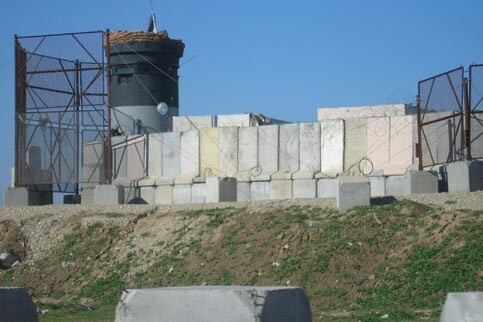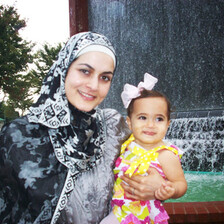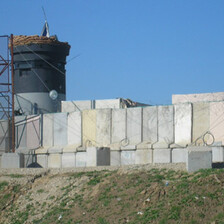Al Jazeera 21 July 2005

Israeli soldiers manning the checkpoint by remote control from behind sniper towers shot at cars and commuters who tried to pass through. A 14-year-old boy, Ragheb al-Abed al-Masri, was killed while waiting to cross to Khan Yunis. (Arjan El Fassed)
A Palestinian teenager has been shot dead while trying to pass an Israeli occupation forces checkpoint in the Gaza Strip. The shooting on Monday occurred as Israel continued its closure on the Gaza Strip for the fifth day in a row, dividing the strip into three areas and shooting at commuters who try to cross.
The Matahen and Abo Holi checkpoints, just north of the town of Khan Yunus, have been closed since Thursday, a day after a Qassam rocket killed an Israeli woman in the Negev town of Sderot, according to Palestinian police officials. The two checkpoints divide southern Gaza from the central and northern parts of the strip.
Palestinian police officer Hisham Salama, stationed at the Abo Holi checkpoint, told Aljazeera.net that Israeli soldiers manning the checkpoint by remote control from behind sniper towers shot at cars and commuters who tried to pass through on Sunday. He said a 14-year-old boy, Ragheb al-Abed al-Masri, was killed while waiting to cross to Khan Yunus.
According to Dr Ibrahim Mssadar, director of the Shuhada al-Aqsa hospital, the boy was waiting at Abo Holi when he was shot in the back, with the bullet leaving his body through his heart and chest.
Israeli denial
Eitan Arusy, a spokesperson for the Israeli Defence Force, said the closures were for security reasons and would continue until further notice.
As for the shooting at Abo Holi, he said Palestinian cars attempted to cross the checkpoint without permission from the soldiers.
“The soldiers fired warning shots into open air, not on the cars. We have no proof of any injuries. Soldiers say they did not see any ambulance at the scene.
“But Palestinian Civil Affairs complained to us, saying there is a 14-year-old boy who was killed at the crossing, so we are still investigating.”
Palestinian police officer Salama added: “After several hours of waiting, drivers attempted to pass through the checkpoint and were subsequently shot at with live ammunition and tear gas canisters.
“We have not received word of when the checkpoint will be reopened for regular traffic. On average, Israeli forces have only opened it for 30 minutes to an hour each evening since Thursday.”
Ditches
Farther north, armoured Israeli bulldozers have dug up the coastal road that connects the central and northern Gaza Strip, creating a 6m-deep trench.
Donkey carts and commercial trucks crowd with taxi cars and fruit vendors on either side of the barrier as they wait to transport people home.
The closures have hindered the movement of thousands of Palestinians between the northern and southern Gaza Strip, including women, children, the elderly and the sick, college students and government employees.
Painful wait
Many have had to wait for hours in the July heat for the reopening of the two checkpoints. “I spent four hours waiting in the blazing sun at Abo Holi and another hour walking past these piles of sand at Netzarim. My legs are swollen and I’m absolutely exhausted,” said 58-year-old Um Khaled, who was visiting her sick daughter in Khan Yunus in the southern Gaza Strip and who was stranded there for more than five days.
Palestinian commuters have been forced to walk about 3km through sand and rocks to make their way across the second barrier leading to Gaza city. The barrier is on the coastal road near the illegal settlement of Netzarim, with a sniper tower overlooking it.
“I have partial paralysis. I can barely stand, let alone walk, but I need to return to my home in Gaza city,” said 75-year-old Abdel Raouf Nasir, as he trudged across the sand barrier on his way home from a visit to his daughter who lives in the Maghazi refugee camp.
Collective punishment
“It’s not our fault. Why are they punishing all of the Palestinian people for the actions of a few? After this, I can’t imagine there will be a withdrawal,” said Nasir, as a donkey cart transporting commercial goods nearly knocked him over. Next to him, a Palestinian suffering from Parkinson’s disease attempted to cross the barrier after seeking treatment in Gaza’s Shifa hospital with his wife.
Other Palestinians reported being shot at by Israeli forces stationed in the nearby sniper tower overlooking the road.
“I was bringing my children back from a visit to their aunt’s in the Nusseirat refugee camp in central Gaza. The driver dropped us off at the Netzarim checkpoint and sped off, since cars aren’t allowed to pass through. We began walking around the trench and the next thing we know, bullets are raining down on us. One bullet barely missed my 15-year-old daughter’s neck. She could feel it whizz by her,” said 35-year-old Hala Ahmed.
Israeli forces have also reinstated a travel ban on Palestinian men and boys between the ages of 16 and 35 from travelling through Rafah crossing, Gaza’s only route to the outside world, according to Emad Khaymar, head of the public relations unit on the Palestinian side of the crossing.
Sealed off
In addition, the Erez Crossing into Israel in the northern Gaza Strip has been sealed since Wednesday, when a bomber blew himself up in the Israeli city of Netanya, killing three Israelis.
The closure has prevented nearly 7000 Palestinian labourers who work in Israel from crossing, in addition to about 900 others who work in the Erez Industrial Zone, according to the Palestinian Centre for Human Rights.
The Gaza-based group says hundreds of sick men, women and children with medical transfer forms were also prevented from accessing hospitals inside Israel and West Bank hospitals.
According to the rights group, the closures violate an individual’s right to freedom of movement and are considered a form of collective punishment under international law.
Leila M. El-Haddad is a journalist based in the Gaza Strip. This article was originally published by aljazeera.net and reprinted on EI permission.





